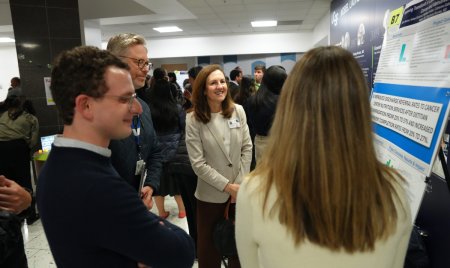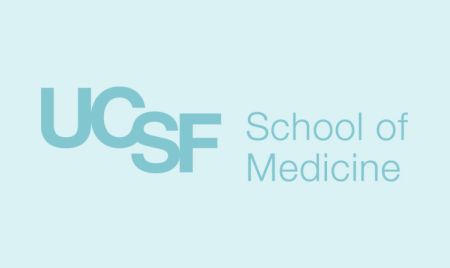UCSF Medical Scientist Training Program Engages Diverse Ideas to Support Discovery

The UCSF Medical Scientist Training Program (MSTP) aims to train the next generation of physician-investigators by offering a rigorous, integrated, and supportive educational experience leading to joint MD and PhD degrees. Graduates of the program have gone on to successful careers in both academia and industry, and the success of the program reflects the innovative environment for training excellent physician-scientists at UCSF.
Currently in its 45th year of continuous NIH support, the MSTP partners with nine different graduate programs, with degrees ranging from basic and biomedical sciences such as Bioengineering and Developmental and Stem Cell Biology to social sciences such as Medical Anthropology in collaboration with UC Berkeley. Students train and serve a diverse patient population in the San Francisco community, as they work in the UCSF Medical Center, the Zuckerberg San Francisco General Hospital, and the San Francisco Veterans Administration Medical Center.
The program is led by Director Aimee Kao, MD, PhD, and Associate Directors, Cathy Lomen-Hoerth, MD, PhD, Dean Sheppard, MD, and Mercedes Paredes, MD, PhD.
Dr. Mercedes Paredes said, “Combining the two worlds of clinical training and graduate training has always been intense and exciting. Even more so now, as cutting-edge technologies in science increasingly inform the care of patients.”
The MSTP offers a wide range of clinical, research, and career support, including faculty-mentored and student-led programs. To guide MSTP students on their career paths, the MSTP Council has more than 30 active faculty members who are experts in a broad range of clinical and research specialties. The program hosts regular meetings between second-year medical students and first-year graduate students and bootcamps such as “Into the Lab” and “Into the Clinic” to guide students as they transition in different stages of their training. Aside from faculty mentorship, students also lead mentorship programs such as Big Sib/Little Sib for MS2s and MS1s and further vertical mentoring strand that extend through graduating MS4s. Subgroups such as Women Physician Scientists and Community of Underrepresented Physician Scientists (CUPS) also served as avenues for students to meet mentors and peers who share the same identities.
“The [MSTP] program has made a commitment to have a diverse freshman class each year, and to create an ever-increasing physician scientist community where our patients can see themselves,” said Dr. Paredes.
Currently, the program is composed of 20% students from underrepresented and disadvantaged backgrounds and 42% women. Furthermore, to foster and support a diverse talent pipeline, MSTP holds informational sessions at local colleges and universities, host booths at conferences such as Society for Advancement of Chicanos/Hispanics and Native Americans in Science (SACNAS) and Annual Biomedical Research Conference for Minority Students (ABRCMS), and collaborates with UCSF’s Science & Health Education Partnership (SEP) and Summer Research Training Programs (SRTP). MSTP students actively host initiatives serving local San Francisco public high school students such as UCSF BrainCamp, Cardiac Camp, and the planned Immuno Camp.
Current MSTP students Lay Kodama and Ian Boothby recently shared their research interests, future goals, program experiences, and advice for students interested in the MSTP.
Lay Kodama is a current MS4 MSTP student with a PhD concentration in Neuroscience. She joined Dr. Li Gan’s lab to study sex-differences in Alzheimer’s disease through the lens of neuroimmunology. Currently, she is in Dr. Marina Sirota’s lab where she uses electronic health records to better understand neuropsychiatric disorders like delirium and dementia, and answers questions inspired by her clinical experiences.
1. What are your long-term goals?
Kodama: During my clerkship rotations, I fell in love with psychiatry. I felt like it was a beautiful combination of centering patient stories and life experiences while also grappling with the mysteries of the human mind. It was the type of practice I always imagined medicine would be like even before coming to UCSF. Starting this summer, I will be joining the research-track psychiatry residency program at UC San Diego, and, in the future, I’m hoping to start a research group studying neuropsychiatric illnesses using clinical data while serving geriatric patients in the clinic.
2. How has the MSTP helped you in achieving your academic and career goals?
Kodama: Maybe it’s cliché, but the best part of the UCSF MSTP program is definitely the people! Trying to juggle and balance two different careers simultaneously can be an isolating experience. You feel like you don’t quite fit into the medical school or the graduate school program, and you constantly have to explain and defend your training path to others (and sometimes to yourself!). The MSTP provides me with the space and community to meet amazing mentors and colleagues who understand and have gone or are going through that journey with me. It’s this community support that’s guided me and helped me develop and achieve my long-term goals.
3. What aspect do you think is unique to the UCSF MSTP program?
Kodama: UCSF is in such a unique environment full of diverse possibilities in and outside of an academic career. I also feel like the MSTP here has the template structure but also the flexibility for students to explore these many opportunities. In my experience, I found that if some group or support structure didn’t exist already, you could build one with the backing of the program. For instance, Parinaz Fozouni and I restarted the Women’s MSTP group our first year in the program to foster a community of women physician scientists. During the last year of my PhD, my advisor moved to an institution in New York City, so I moved with her. The COVID-19 pandemic hit when I was transitioning from graduate school back to medical school, so I decided to delay my return by doing an internship at Genentech to learn more about industry. For each of these examples, I had wonderful mentors from the UCSF MSTP who gave me advice, support, and the courage to navigate these transitions.
4. What advice would you give someone considering the MSTP program?
Kodama: It’s hard to give specific advice since every person has different priorities, and these priorities change over time. For me, not only did my research interests evolve, but I also got married, adopted a dog, and am planning to start a family. The boundaries between life and work became more fluid as I progressed in my training, and I think MSTP programs need to be aware of this to support the whole trainee. To that end, one general advice would be to first self-reflect and know what your priorities are, then find a training place where you think those priorities are supported and valued and where people are flexible and accepting of diverse interests. The MSTP is a long road but find a community that will uplift and inspire you, and remember to enjoy the journey!
Ian Boothby is a current MS4 MSTP student with a PhD concentration in Biomedical Science. He investigated the interactions between the immune system and skin fibroblasts (cells that make connective tissue and form scars), where he found a specialized type of fibroblast that is highly responsive to inflammation and can both activate immune cells and provide a habitat for them to survive in the skin. Toward the end of his PhD, he investigated whether this fibroblast cell type might cause certain autoimmune fibrosing (scarring) skin diseases.
1. What are your long-term goals?
Boothby: I'm hoping to have a traditional academic physician-scientist career: running a lab, seeing patients, and mentoring trainees. I'd love to develop my PhD work into a broader research program that studies how the connective tissues of our body interact with the immune system, while treating patients with autoimmune and connective tissue diseases.
2. How has the MSTP helped you in achieving your academic and career goals?
Boothby: The MSTP supports us in many obvious ways: it funds our training, helps us navigate both medical and graduate school, and provides mentoring and career development opportunities. However, I think the most impactful part for me has been the community. I have relied a lot on my MSTP peers for advice, solidarity, and inspiration, and I count several of them among my closest friends. I also have derived a lot of motivation from physician-scientist mentors I've met through the program.
3. What advice would you give someone considering the MSTP program?
Boothby: Talk to as many MSTP students, residents, and faculty as you can before applying! It is a rewarding training path but there are many sacrifices along the way. There's lots of ways to be a great physician or a great scientist, but to make all the extra years of MSTP training count takes loving (and committing to) both disciplines for many years.









